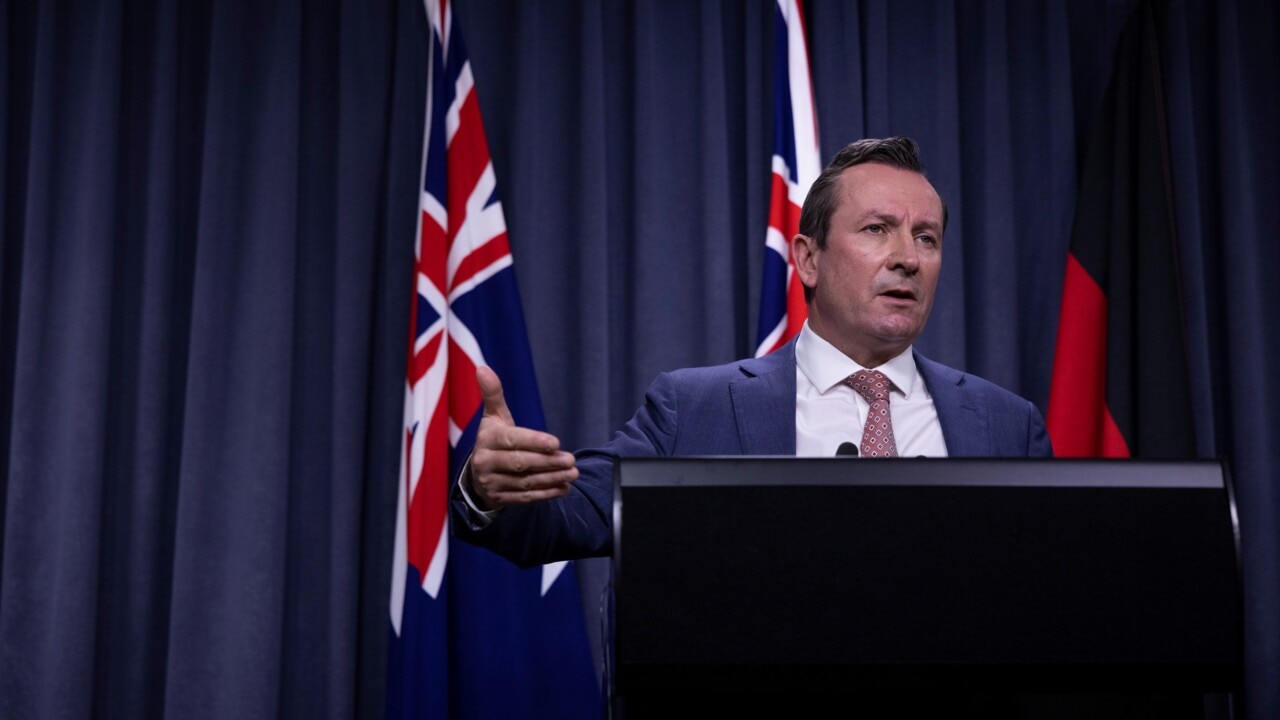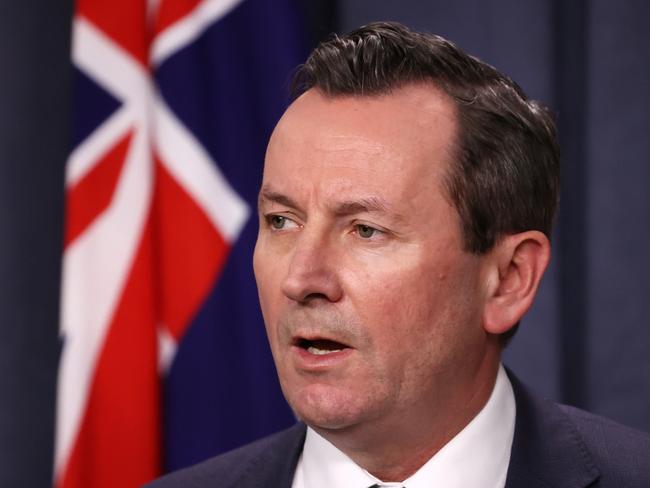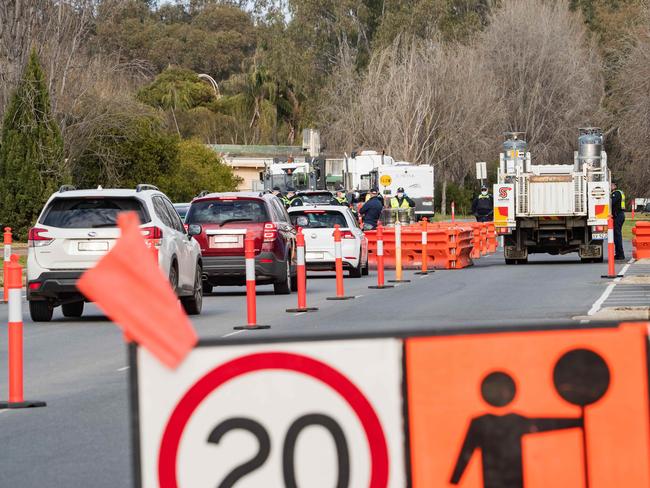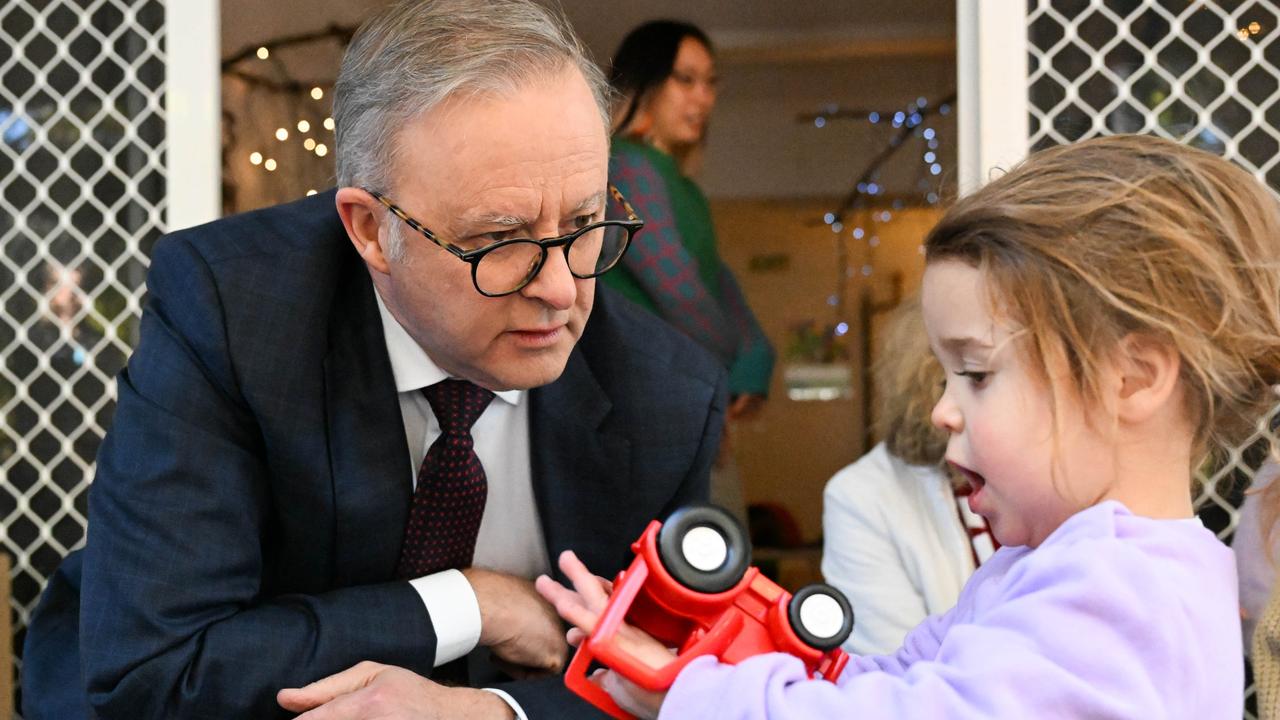State of Aussie borders: where you can, and can’t, go
Western Australia has a hard border again with the entire rest of Australia. Check the state of our borders.

National
Don't miss out on the headlines from National. Followed categories will be added to My News.
Western Australia has moved to a hard border from Boxing Day with the rest of the country.
The Northern Territory and Tasmania will go from “low risk” to “medium risk”, which means travellers will need an exemption and must quarantine for 14 days.
Those jurisdictions will join Queensland, South Australia and the ACT as medium risk, while NSW and Victoria will remain “extreme risk”.
“These decisions have not been taken lightly,” Mr McGowan said.
“No one wants to stop families returning home to WA during the festive season. No one.
“But given the escalating crisis in other parts of Australia, and based on updated health advice, we have taken this step to protect West Australians and stop any spread of the virus into our community.”
WA was still on track to reopen its border on February 5 “barring a catastrophe”, the Premier added.

The premier also announced he will expand the state’s Covid-19 vaccine mandate to include booster shots.
Workers in Western Australia who fall under the Covid-19 vaccine mandate must now also get a booster shot, Mr McGowan has announced.
WA is the first jurisdiction to mandate the third dose and it will cover industries including aged care, health, quarantine staff, mining and essential workers.
The premier said he also expected to eventually extend the mandate to anyone wanting to attend events, such as sport and concerts.
Here’s how the rest of the nation stands on borders:
TASMANIA
After months of changing border restrictions, Tasmania has reopened to travellers from around the country, as double dose vaccination rates near 90 per cent.
All travellers entering Tasmania must complete a Tas E-Travel pass via the Tas E-Travel website.
Those from high-risk areas will need to be tested 72 hours before travel.
Those travelling internationally will be required to quarantine for seven days, in addition to those measures.
For those who refuse to comply, there could be consequences. Rule breakers risk an on-the- spot-fine of $1557 or being summonsed with an offence to potentially cop up to six months in jail, or a greater fine of up to $17,000.
Non-compliant travellers could also be sent packing.
“Over the last 22 months, we’ve made some very difficult decisions,” Premier Peter Gutwein said. “We’ve had to stop people entering to attend a funeral, bury a loved one, we’ve stopped weddings, we’ve stopped events.”
SOUTH AUSTRALIA
South Australia’s borders are open to vaccinated travellers.
But South Australian Premier Steven Marshall emerged from emergency talks on Saturday, December 4, saying authorities were “extraordinarily concerned” about the Omicron variant. He stopped short of slamming borders shut. Instead, he announced travellers from NSW, Victoria and the ACT were required to have a Covid test on arrival into the state. If they plan on staying in South Australia, they will need to have a further test on day six.
Quarantine for international arrivals will go back to 14 days.
QUEENSLAND
The Sunshine State’s borders reopened to interstate visitors on December 13, four days ahead of schedule, after the state hit the 80 per cent double dose vaccination mark.
Fully vaccinated Australians are able to enter the state domestically by road or air, but must undergo a PCR test and return a negative result in the 72 hours prior to departure.
All arrivals, regardless of vaccination status, must get another Covid-19 test on day five after arriving in Queensland.
However, unvaccinated people arriving from hot spots must arrive by air and undergo 14 days’ hotel quarantine.
International arrivals must be fully vaccinated, return a negative test within 72 hours of departure, and must do 14 days of home or hotel quarantine.
Fully vaccinated border zone residents with a border pass will be able to move freely across the border, no test required.

NSW, VICTORIA
NSW and Victoria have kept the borders open over the festive season.
Victorian Premier Daniel Andrews said he and NSW Premier Dominic Perrottet had been texting and had agreed they would not pursue an “Omicron zero” strategy.
“The notion that we try and keep this out forever … that just doesn’t make sense,” Mr Andrews said on Sunday, December 5.
He said both he and Mr Perrottet agreed it was important to reassure Australians that the borders were not at risk of closing ahead of Christmas.
“We think that’s important not just for the people of Victoria and NSW, but if Victoria and NSW are working closely together, I reckon that’s pretty good for the rest of the country as well,” Mr Andrews said.
Domestic visitors to Victoria no longer need to get a travel permit to enter the state, regardless of their vaccination status, unless they have been overseas in the past 14 days.
Victoria requires a permit to enter from overseas.
Domestic travel into NSW is restricted when a NSW Health identifies affected areas, areas of concern and places of high concern. Victoria and the ACT have been declared places of high concern; close contact. Anyone entering from these states – both residents and nonresidents – must adhere to stay-at-home orders.
All unvaccinated passengers from any overseas country entering NSW must enter hotel quarantine and must follow the rules for people who are not fully vaccinated.
NORTHERN TERRITORY
Only Covid-19 fully vaccinated people, Territory residents and people unable to be vaccinated (such as children under 12 years) are able to enter the Northern Territory.
Unvaccinated Territory residents travelling from a “green zone” are required to quarantine.
Fully vaccinated domestic and overseas arrivals from a Covid-19 “red zone” may be permitted to undertake seven days home quarantine.
International arrivals who come in on a DFAT flight are still required to undertake 14 days quarantine at a supervised facility.
Unvaccinated Territory residents and people who have received authority via the “approval to enter the NT form” who are coming from a red zone, are required to undertake 14 days mandatory supervised quarantine.
AUSTRALIAN CAPITAL TERRITORY
The ACT’s rules and restrictions include high-risk geographical areas, places of concern and close and casual exposure locations.
NSW and Victoria have been labelled high-risk geographical areas.
Queensland, SA, NT, Tasmania are rated on exposure locations.
There are no restrictions for WA or Jervis Bay.
Fully vaccinated residents and nonresidents of the ACT who have been in a high-risk geographical area in the last 14 days are permitted to enter the ACT for any reason but must complete an exemption form within 72 hours prior of their intended arrival into the ACT. All other fully vaccinated residents or nonresidents that have not ben in high-risk geographical areas in the past 14 days can enter the ACT for any reason without filling an exemption form or having to do quarantine.
Unvaccinated residents that have been to high-risk geographical areas must quarantine for 14 days. But all other unvaccinated residents can enter the ACT without having to quarantine.
Unvaccinated nonresidents cannot enter the ACT without an exemption. Those that receive an exemption must follow Stay At Home requirements.
Unvaccinated nonresidents that have not been to a high-risk geographical area can enter the ACT for any reason and do not need to undertake quarantine.
International arrivals that are vaccinated must complete a three-day quarantine period at their residence or accommodation. Unvaccinated arrivals must enter 14 days’ quarantine.
Originally published as State of Aussie borders: where you can, and can’t, go




